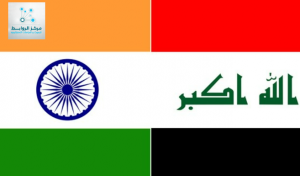By: Shatha Kalel
The trade relationship between India and Iraq has seen significant growth over the past year. According to data from the Indian Ministry of Commerce and Industry, Indian exports to Iraq from April 2023 to March 2024 surged by 24%, reaching a value of $3.4 billion. This increase reflects India’s expanding export portfolio and the strengthening economic ties between the two countries. This report delves into the specifics of this growth, highlighting key sectors and providing an analysis of the underlying trends.
Key contributors to this growth included a significant rise in rice exports, which soared by 131%, reaching a value of approximately $910 million. This is a substantial increase from the $392 million recorded in the same period last year.
Conversely, exports of fossil fuels saw a decline of 9.15%, dropping from $879 million to $799 million. Despite this decrease, other sectors experienced notable growth. Indian meat exports rose by 41.5%, increasing from $232 million to $329 million.
Iron exports experienced a remarkable increase of 153%, while tea exports grew by 141%, fruit exports by 114%, clothing exports by 106%, and vegetable oil exports by 103%. However, sugar exports were an exception, decreasing by 85%.
India has become Iraq’s fifth-largest source of goods, following the UAE, China, Turkey, and Iran. These statistics reflect direct exports from India to Iraq and could potentially rise further if the value of goods re-exported from the UAE is included, as a significant proportion of these re-exports are Indian products.
On the other hand, the value of Iraq’s exports to India, primarily consisting of crude oil, decreased from $34 billion to $30 billion during the same period.
Analysis
The significant increase in direct Indian exports to Iraq can be attributed to several factors. First, the impressive growth in rice exports indicates a strengthening agricultural trade relationship. The 131% rise suggests a robust demand for Indian rice, likely driven by competitive pricing and high quality. This surge also reflects India’s strong agricultural production capabilities and efficient export logistics.
The decline in fossil fuel exports, despite overall growth in other sectors, can be linked to global fluctuations in energy demand and prices. It may also indicate a shift towards diversification in India’s export portfolio, reducing dependency on fossil fuels and focusing on other commodities with higher growth potential.
The substantial increases in meat, iron, tea, fruit, clothing, and vegetable oil exports highlight India’s expanding industrial and agricultural sectors. These sectors have benefited from advancements in production technologies, quality control, and supply chain management, enabling India to meet the rising demands in Iraq.
The sharp decrease in sugar exports could be due to several factors, including changes in global sugar prices, production issues, or shifting trade policies. This drop suggests a need for strategic adjustments in the sugar export market to regain competitiveness.
India’s position as Iraq’s fifth-largest source of goods underlines the strength of bilateral trade relations. The potential increase in exports, considering re-exports from the UAE, points to the interconnected nature of regional trade networks and the importance of intermediary trading hubs like the UAE.
On the flip side, the decrease in Iraq’s crude oil exports to India reflects broader trends in the global oil market, including price volatility and shifts in supply and demand dynamics. This reduction also underscores the need for Iraq to diversify its export portfolio to mitigate risks associated with heavy reliance on a single commodity.
In conclusion, the increase in Indian exports to Iraq demonstrates the resilience and adaptability of India’s export sectors. It highlights the strategic efforts to diversify export products and strengthen trade relationships. For Iraq, the data suggests opportunities for enhancing trade partnerships and exploring new markets beyond crude oil to ensure sustainable economic growth.
Economic Studies Unit / North America Office
Rawabet Center for Research and Strategic Studies

